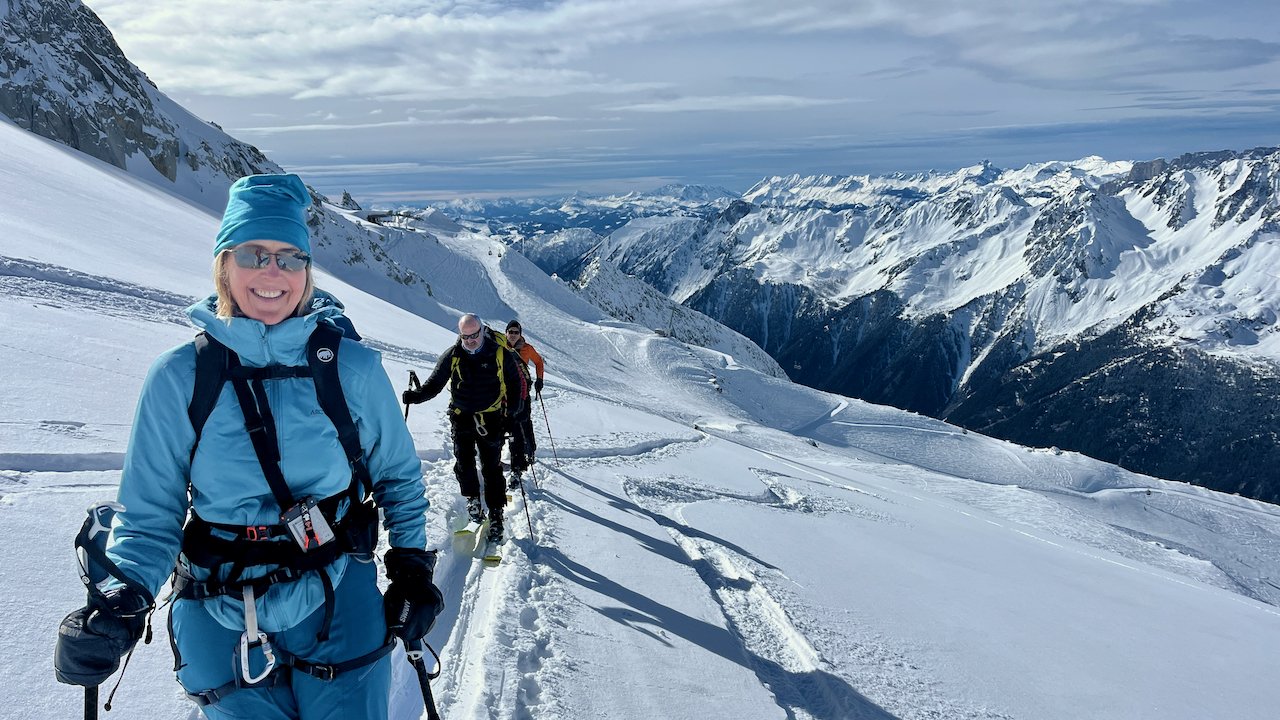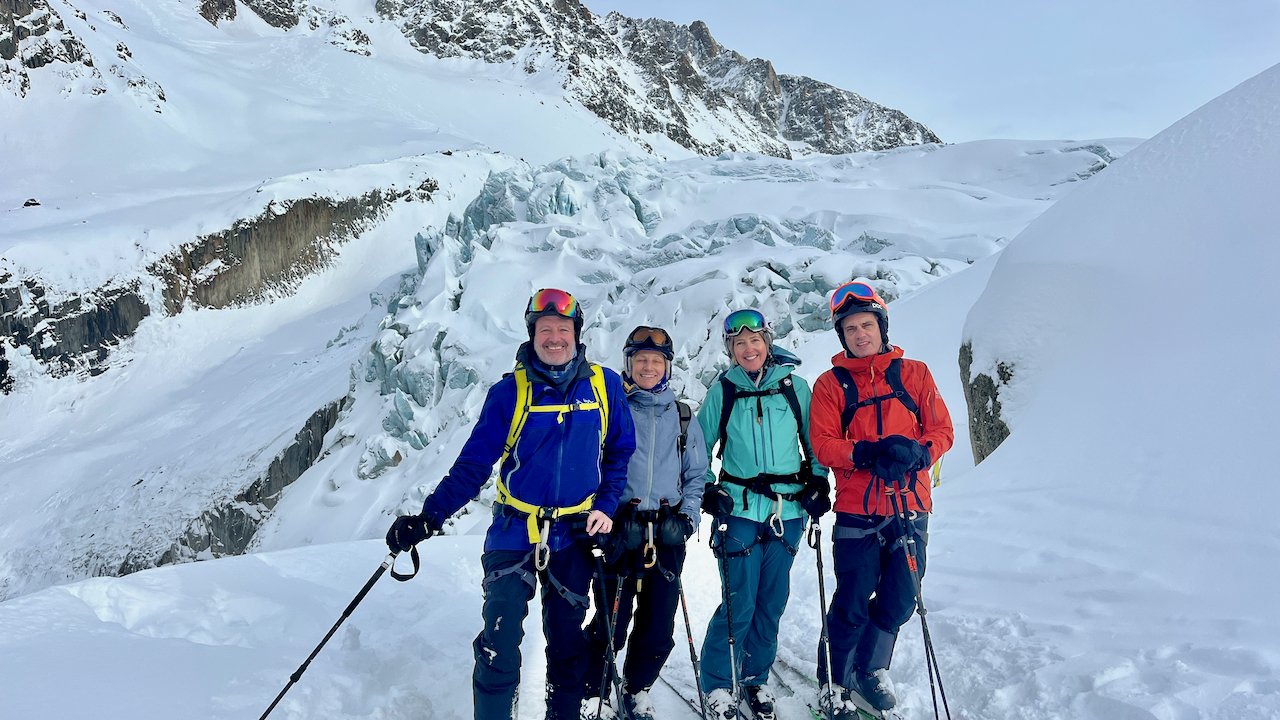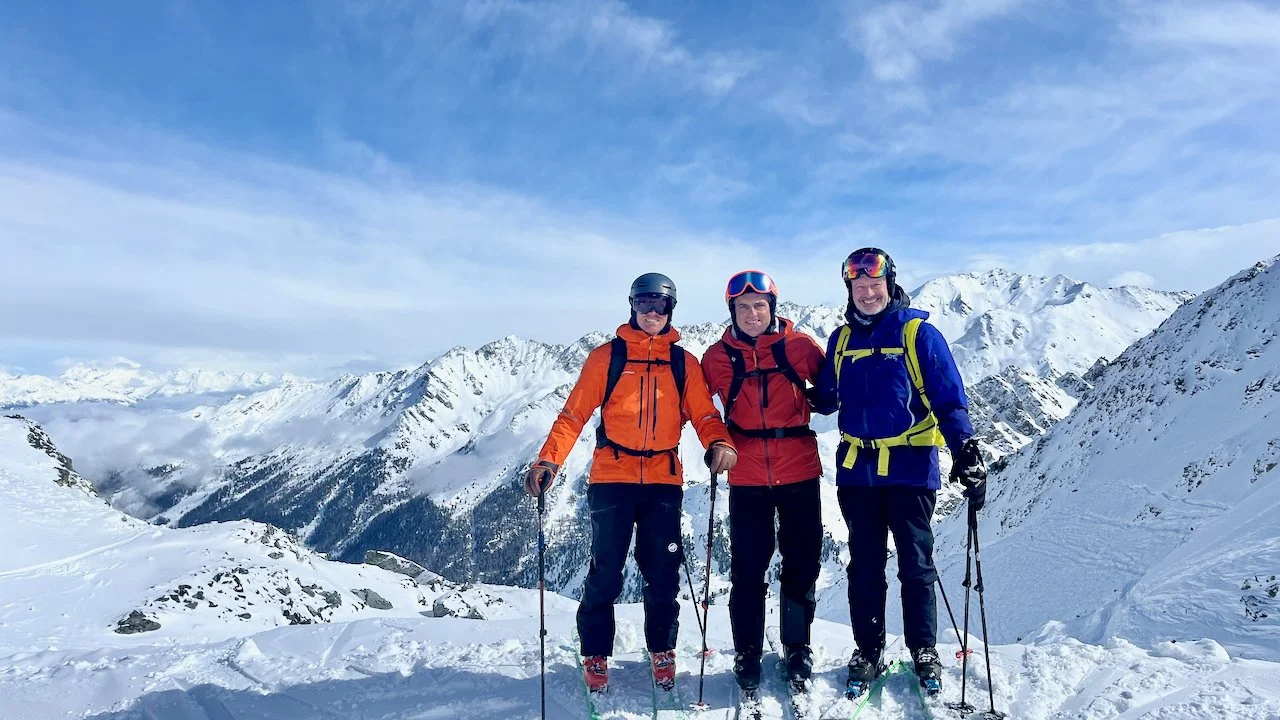DREAM TRIP REPORT: FREERIDE HAUTE ROUTE
Taking in the views after a big day of backcountry skiing near Verbier
A Note from Jeff: I spent February to April 2024 in the Alps, based in Chamonix, France. This is part one of the story of my winter.
From February 24-March 1, 2024, my dream became reality when I led a ski trip from Chamonix, France to Zermatt, Switzerland. This trip vaguely followed the path of the world-famous Haute Route, which traverses over glaciers and high peaks from Chamonix to Zermatt. Unfortunately, the original Haute Route involves more traversing than skiing, and nights are spent in crowded high-mountain huts rather than quaint hotels and inns. It bypasses the unique cultural experience, food, and hospitality that I appreciate so much about the Alps.
So instead of traversing from hut to hut, we opted to ski from town to town, using the impeccable lift systems to reach high summits. Nowhere else on earth can you to start in one valley in the morning and finish miles away after skiing lift-accessed powder all day long. This is what makes the Alps so special, and it has captivated my skiing imagination in recent years. From the top of each ski area, we would descend the backside, leaving the crowds behind, and end up in a completely new valley each afternoon. After skiing to the next village, we would spend the night at a comfortable hotel and celebrate the day’s achievements with a delicious meal. Occasionally, we donned climbing skins to complete the route, and we even built in a helicopter drop-off to complete the route to Zermatt.
Quick stats:
Towns Visited: 4
Heli Drops: 1
Trams Ridden: 6
Inches of Snowfall throughout the week: 24
Vertical Feet of Skinning: 4,500
Vertical Feet of Skiing: 50,000
Plates of Fondue consumed: 18
Varieties of wine sampled: 8
Languages spoken: 3
Average lift ticket price: $86
Backcountry terrain near Chamonix
I was tipped off to the possibility of this route by Daniel Sundqvist at Pollux Adventures, who had completed segments before. Once the idea was in my head, I knew I had to make it a reality. Countless hours of research went into planning this trip. I scoured maps and memorized ski lift timetables. I booked hotels, dinner reservations, and heli-drops for months before the trip started. The result was even better than I could have dreamed. This is truly the ski trip of a lifetime, and a proud addition to the Amora Vida repertoire.
arrival
After a day of travel for our guests to Geneva and a 1-hour shuttle to Chamonix, we met for dinner at one of the best restaurants in town. There, we enjoyed a delicious dinner of french cuisine, prepared in the traditional style of the Haute-Savoie, the local mountain region. Local red wine and a long night of sleep helped dispel the jet lag.
Dinner at La Tablée in Chamonix is the perfect welcome to France.
Day 1: Chamonix and Les Grands Montets
To warm up our ski legs and check out the local ski terrain, we chose the Grand Montets ski area, which boasts 5,000 vertical feet (1,450 meters) of lift-accessed “freeride” (off-piste) terrain. It was a powder day, so we skied a few untracked laps from the lifts before donning skins for a 1-hour ascent of 1,000 feet (300 meters) to a high saddle. “Les Grands,” as the locals call it, is my favorite resort in the Chamonix area and my first choice on a big powder day.
Skinning above the lifts of Les Grands Montets ski area in Chamonix
Skiing off the backside and onto the Argentière Glacier is one of the most beautiful tours around, and a must-do for any skier who visits Cham. Skiing on glaciers is something that we don’t get to do very often in the U.S., and it’s a sublime experience. At the bottom of the glacier, a traverse brings you back into the ski area and down to town for an après-ski celebration. Dinner tonight featured fondue and veal stew, local specialties.
The toe of the powder-covered Argentière Glacier, near Les Grands Montets ski area
Day 2: CHAMONIX SKI TOURING
The original plan was to ski the Vallée Blanche, a powder-covered glacier descent from the top of the Aiguille du Midi cable car, rising almost 9,000 vertical feet above Chamonix. But since the high peaks were covered in cloud, we spent the day doing a ski tour from Brévent to Flégère, two of the ski areas on the other side of the Chamonix valley. These resorts have tons of off-piste chutes and bowls and incredible views of the Mont Blanc Massif directly across the valley.
Touring above Le Brévent in Chamonix, with the Mont Blanc Massif in the background
Dropping off the backside, we skied untracked powder with nobody else around. A short skin ascent back up to the ridgeline brought us to a wide-open powder valley back to Chamonix for après-ski. Then, we took a quick shuttle from Chamonix to Verbier, arriving in time for an early dinner.
Untracked backcountry powder skiing in Chamonix
Day 3: Verbier
In my opinion, Verbier is the best ski resort on Earth. Jackson Hole boasts their single tram with a relatively cute 4,200 vertical feet of elevation gain and 2,500 skiable acres, but Verbier has seven trams, 6,000 vertical feet of elevation gain, and 101,000 skiable acres. As a comparison, the Utah resorts of Alta, Snowbird, Solitude, Brighton, Park City, The Canyons, and Deer Valley have only 20,000 skiable acres combined.
Admiring the views and incredible ski terrain at Verbier. If you like chutes, bowls, and steep open faces, Verbier has to be on your bucket list.
Most skiers never leave the piste, much to the surprise of most American guests, and we were able to find fresh snow all day long without putting on our skins even once. Our ski legs were burning by the end of the day, but fortunately, the long run back to town has regular stops at on-slope après-ski bars with DJ beats blaring to break up the descent to town.
Verbier is home to some of the best lift-accessed backcountry ski terrain on earth. For example, a cable car deposits skiers at the peak in the top of this photo, but there is no groomed run down.
After relaxing at our hotel, we enjoyed a delicious meal of traditional Raclette. Most Americans think this meal involves cooking meats and cheeses on a table-top grill, but in Verbier and the Val de Bagnes, where Raclette originates, an open wheel of cheese is melted underneath a wood fire while a racleur scrapes the melted cheese onto each guest’s plate. This mild melted cheese is eaten with baked fingerling potatoes, pickled onions, and sliced meats. It is usually served with Fendant, a light and easy-drinking white wine.
Fine dining and excellent wine in Verbier
Day 4: Verbier to Arolla
This morning, we packed our bags and took a series of trams to the summit of Mont Fort, the highest point in Verbier, with incredible views of Mont Blanc and the Matterhorn. A wild backcountry descent off the backside of this peak brought us to the far reaches of the “4 Vallées” ski area, of which Verbier is just one. A short skin ascent allowed us to reach a remote summit, and a final 4,000-foot backcountry descent deposited us in a totally new valley, the Val d’Herens.
Touring into the far reaches of the 4 Vallées ski area, far away from the crowds
Home to quaint alpine towns and villages, this valley is left alone, since nearby Chamonix, Verbier, and Zermatt get most of the skier visitation. From the bottom of our descent, we took a short taxi to Arolla, our home for the next two nights. Our luggage was transported from Verbier to Arolla while we skied.
Far from the beaten path in the Val d’Herens
Day 5: AROLLA HELI-ACCESSED SKI TOURING
The original plan for this day was to enjoy the lift-accessed backcountry terrain around Arolla. But instead, we started with a helicopter drop-off on the summit of a nearby peak. In Switzerland, only a few areas are designated as mountain helicopter landing sites, and Arolla is situated perfectly to take advantage of four different heli-skiing peaks. (In fact, Arolla is one of the best destinations for a heli-skiing trip to Switzerland…) However, due to the sheer scale of each descent and the complex glaciers, it is common to use only one or two helicopter drop-offs each day, then touring for additional runs once you have been dropped off in the high mountains.
Admiring our untracked turns after a heli drop
After an exciting flight to the summit, we enjoyed a long, untracked descent. From the valley bottom, we skinned for about an hour and a half to a high saddle. It was all downhill from here, with turn after turn of powder skiing, passing the famous Cabane de Prafleuri, one of the stops on the traditional Haute Route. We skied all the way to the valley bottom, for a final descent of 4,500 vertical feet. A short taxi ride back to Arolla was followed by another delicious meal.
Untracked powder and sunny skies on our heli-touring day
Day 6: Zermatt
A helicopter drop-off from Arolla to Monte Rosa, high above Zermatt, was the plan for the day. However, a potent storm arrived and forced us to spend the previous day using the helicopter bump instead. So today, we took a taxi around the storm from Arolla to Zermatt, and spent the day skiing powder in the trees of this world-class resort.
The Alps have tree-skiing, too… Powder-filled glades in Zermatt
In the Alps, most people don’t even leave the hotel when it’s snowing, instead opting for the spa or a local wine bar. Zermatt has plenty of these, and a few group members decided to enjoy town life while the rest of us chased powder through spaced trees and glades of the lift-accessed Zermatt backcountry. A final celebration dinner in Zermatt was the perfect way to wrap up a fantastic trip.
A snowy afternoon in downtown Zermatt, Switzerland
Day 7: DEPARTURE
The last day of the trip dawned cold and clear, offering amazing views of the Matterhorn from our hotel balcony. From Zermatt, the excellent Swiss train system whisked our guests away to the Geneva airport, no need for a taxi. I took the train back to Chamonix to welcome our next group of skiers, this time for a week of powder skiing
Sunrise on the Matterhorn from our hotel balcony, Zermatt
This trip allowed us to maximize downhill powder skiing, or “Freeride” skiing, while completing the traverse from Chamonix to Zermatt. Along the way, we enjoyed the best of each valley’s culture, from the more classically French Chamonix valley to the Swiss-French regions of Valais, culminating in the Swiss-German culture of Zermatt and the Mattertal Valley. The cuisine, scenery, and hospitality of these valleys are matched only by the quality of skiing that we found along the way. This trip is a must-do for any adventurous skier, and one that I will repeat again and again.
Thanks for an awesome trip, team! On the viewing platform atop Mont Fort, Verbier

















